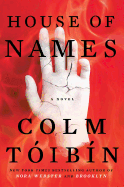
Colm Tóibín (Nora Webster) is one of fiction's greatest artists of humiliation and heartache. In The Master, he portrays a Henry James smarting from the failure of his play Guy Domville and struggling to hide his homosexuality. In Brooklyn, a young Irish woman immigrates to the U.S. in the 1950s and contends with a difficult employer and a marriage she tries to keep secret. Now, in House of Names, Tóibín turns to the myth of Agamemnon, the king who commanded forces in the Trojan War, and his wife, Clytemnestra, who was instrumental in her husband's murder.
Clytemnestra had a good reason for bearing her husband and the gods a grudge. In his zeal to win the war, Agamemnon struck a deal with the deities, who said, "Kill the innocent girl in return for a change in the wind." The girl in question is the couple's older daughter, Iphigenia. When Agamemnon allows her to be killed, the gods guarantee his victory. Now, a furious Clytemnestra wants revenge, and she recruits a prisoner who is also her lover to assist. Tóibín tells the story from the perspective of three characters: Clytemnestra; Orestes, her son, who in Tóibín's rendering grapples with feelings for his friend Leander; and her younger daughter, Electra, who along with her brother seeks retribution when she learns of their mother's scheme. If Orestes is a less engaging guide than his mother and sister, House of Names is nonetheless a memorable work about repression, human failings and the allure of vengeance. --Michael Magras, freelance book reviewer

